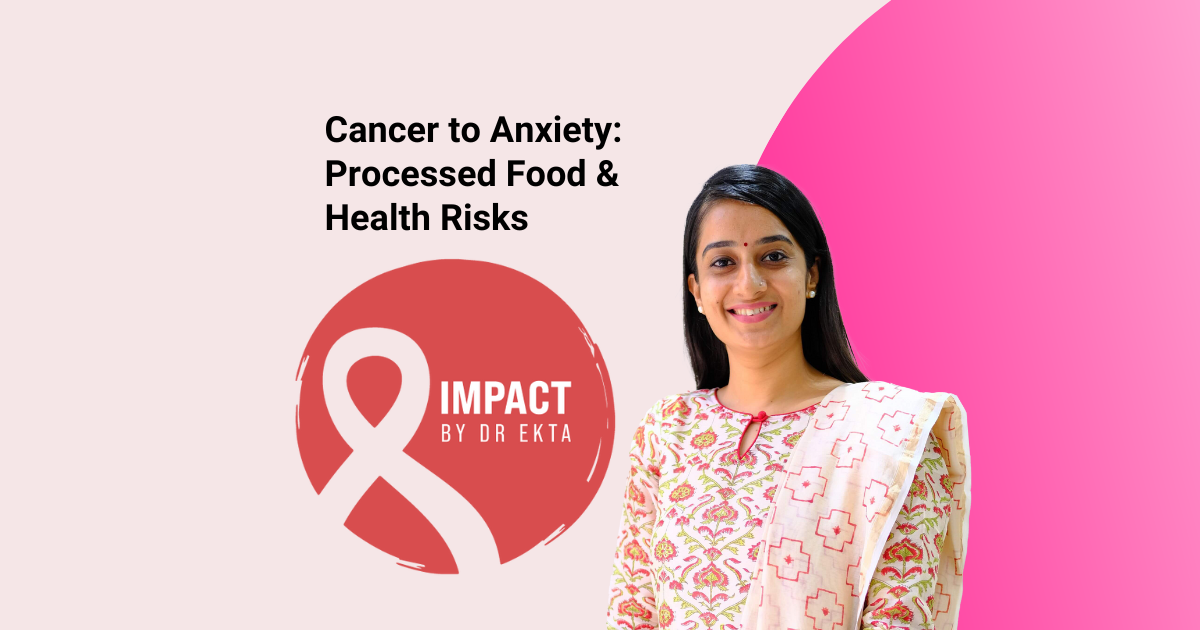One of the most frequently asked questions I get is about the role of diet in maintaining overall health and preventing diseases. Patients often wonder if what they eat can really affect their risk of conditions ranging from cancer to anxiety. The answer is a resounding yes.
Processed foods, often a staple in many diets, have become a significant concern due to their links with chronic diseases, including cancer and mental health issues like anxiety. In this blog, I’ll share my insights on how processed foods impact health and why making mindful choices can protect you from risks spanning cancer to anxiety.
What Are Processed Foods?
Processed foods are any foods that have been altered from their natural state, either for preservation, taste enhancement, or convenience. This includes canned vegetables, packaged snacks, sugary cereals, frozen meals, and even processed meats like sausages and hot dogs.
While not all processing is harmful (e.g., pasteurization of milk), heavily processed foods often contain excessive amounts of added sugar, salt, unhealthy fats, artificial preservatives, and flavor enhancers.
The Link Between Processed Foods and Cancer
As an oncologist, I cannot emphasize enough the importance of understanding the link between processed foods and cancer. Studies have shown that high consumption of processed and ultra-processed foods is associated with an increased risk of several types of cancer, including colorectal, breast, and stomach cancers.
Here’s how processed foods contribute to cancer risk:
- Chemical Additives: Many processed foods contain artificial preservatives, such as nitrates and nitrites, which can form carcinogenic compounds during digestion. These are particularly common in processed meats.
- High Sugar Content: Sugary foods contribute to obesity, which is a significant risk factor for several cancers. Additionally, high blood sugar levels can create an environment conducive to cancer cell growth.
- Trans Fats: Often found in packaged snacks and fried foods, trans fats promote inflammation, a known contributor to cancer development.
- Lack of Nutrients: Processed foods are often stripped of essential nutrients, leaving the body vulnerable to oxidative stress and DNA damage.
Processed Foods and Anxiety
Interestingly, the connection between diet and mental health has been gaining recognition in recent years. Processed foods are not only linked to physical health issues but can also exacerbate mental health problems, including anxiety.
Here’s how processed foods affect mental health:
- Blood Sugar Spikes and Crashes: Foods high in refined sugars can cause sudden spikes in blood sugar levels, followed by crashes. These fluctuations can trigger anxiety symptoms, such as irritability, nervousness, and fatigue.
- Gut-Brain Axis: The gut microbiome plays a critical role in mental health. Processed foods, high in sugar and low in fiber, disrupt the gut microbiome, potentially leading to anxiety and depression.
- Deficiency in Key Nutrients: Diets dominated by processed foods often lack essential nutrients like magnesium, zinc, and B vitamins, which are crucial for managing stress and maintaining mental well-being.
- Inflammation: Chronic inflammation caused by unhealthy fats and additives in processed foods is a known factor in anxiety and other mental health disorders.
The Science Behind It: From Cancer to Anxiety
One fascinating area of research explores the shared pathways between physical and mental health risks linked to processed foods. Chronic inflammation, oxidative stress, and hormonal imbalances caused by these foods are common culprits in the development of cancer to anxiety.
For example, chronic inflammation can damage cells, increasing the risk of cancer while also affecting brain function and mood regulation. Similarly, oxidative stress caused by free radicals from processed foods can impair DNA and brain cells alike.
My Advice: How to Make Better Choices
When it comes to reducing the risks associated with cancer to anxiety, small changes in your diet can make a big difference. Here are some tips I recommend to my patients:
- Choose Whole Foods: Opt for fresh fruits, vegetables, whole grains, nuts, seeds, and lean proteins. These are rich in nutrients and free from harmful additives.
- Read Labels: If you do buy packaged foods, read the ingredient list carefully. Avoid items with long lists of unrecognizable or artificial ingredients.
- Limit Processed Meats: Reduce your intake of processed meats like sausages, salami, and bacon. Choose fresh, unprocessed meat or plant-based protein alternatives.
- Cook at Home: Preparing meals at home allows you to control the ingredients and avoid hidden sugars, salts, and unhealthy fats.
- Hydrate Wisely: Skip sugary beverages and opt for water, herbal teas, or fresh fruit juices instead.
- Prioritize Fiber: High-fiber foods, such as vegetables, legumes, and whole grains, support gut health, which is vital for both physical and mental well-being.
The Role of Awareness
As a healthcare professional, I believe that awareness is the first step toward change. Many people consume processed foods daily without understanding the long-term health implications. Educating yourself and those around you can lead to healthier choices and a better quality of life.
Finding Balance
I understand that completely eliminating processed foods can be challenging, especially in today’s fast-paced world. The key is to strike a balance. Enjoying an occasional treat is fine, but it should not dominate your diet.
Aim for an 80/20 approach where 80% of your meals consist of whole, unprocessed foods, and 20% allow for occasional indulgences. This way, you can still enjoy your favorite treats without compromising your health.
Final Thoughts
From cancer to anxiety, the risks associated with processed foods are too significant to ignore. My goal is not to scare you but to empower you with knowledge so you can make informed decisions about your health.
Every small change you make today like swapping processed snacks for fresh fruit or cooking meals at home brings you one step closer to a healthier future. Remember, your diet is a powerful tool, and with mindful choices, you can protect yourself and your loved ones from the risks of processed foods.
Let’s work together to prioritize health, reduce the burden of chronic diseases, and create a future where we’re not just surviving, but thriving.

